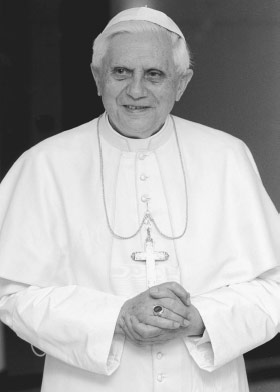Calling Up The Dead
 A while ago I promised a friend that I would do an in-depth treatment of the Catholic Church’s teaching on the Communion of Saints. I’m still planning on doing that more detailed examination at some point in the future, but today I’d like to do another brief post following on from yesterday’s posts about All Saints Day.
A while ago I promised a friend that I would do an in-depth treatment of the Catholic Church’s teaching on the Communion of Saints. I’m still planning on doing that more detailed examination at some point in the future, but today I’d like to do another brief post following on from yesterday’s posts about All Saints Day.
I’ve mentioned Jay before, a Protestant with whom I dialogued for several months. During our discussions he brought up the subject of the Saints. It wasn’t really pertinent to the subject at hand so I didn’t dwell on it for long, but here was what I wrote to him:
“The Saints” was another issue you raised, but again, in an effort to stay on-topic, I’ll try to be brief.
We don’t worship Saints – we honour them. Worship is for God alone. If you catch any Catholic worshiping a Saint, let me know and I’ll make sure that both their Priest and Bishop find out. I will ensure that they are kept behind after Mass for extra catechism classes while the other parishioners enjoy coffee and donuts 😉
I can pretty much guarantee that all of your disagreements stem from how you view the Church. The Catholic view is that the Body Of Christ is simply one, composed of:
1. …those here on earth (“Church Militant”)
2. …those in purgatory (“Church Expectant”)
3. …and those in heaven (“Church Triumphant”).
Although we may be physically separated by the barrier of death, we nonetheless remain united to each other.
I’m sure you’ve asked people to pray for you before – it’s a very natural thing to do and I’m guessing you would find no conflict here with 1 Timothy 2:5 (to which you allude). Moses, Abraham and Job were all mediators and intercessors. In fact, as you rightly point out, interceding for others is a living out of our universal priestly calling.
I would also suggest that the people you ask to pray for you are often those whose faith is the strongest, as you hope in the power of their intercession (James 5:17). The Catholic response to this is a hearty “Amen!” But how much more powerful will the prayer be of one who has been completely sanctified and is standing before the throne of God?
There’s loads more I could say about this, but I’ll simply say that this is why we ask Saints for their intercession and why the Vatican teaches “filial reverence” – it’s simply because these are people who are part of the Church – it’s just that this part that is in heaven.
 Yesterday, I posted a
Yesterday, I posted a  This post is one of those which has languished in my “Drafts” folder for far too long. Fortunately, a
This post is one of those which has languished in my “Drafts” folder for far too long. Fortunately, a